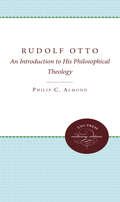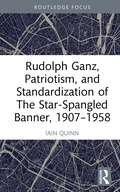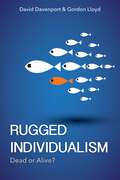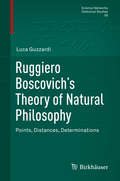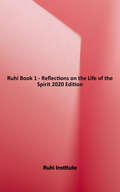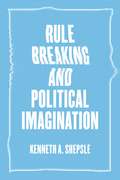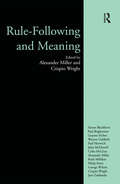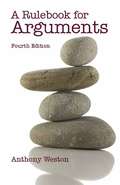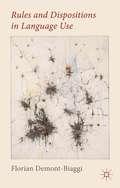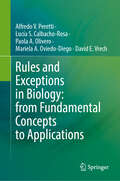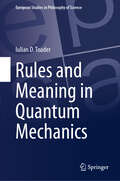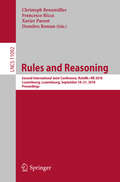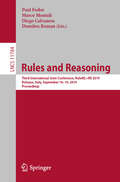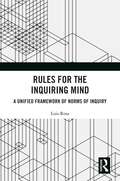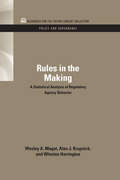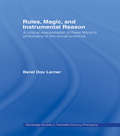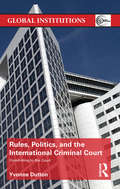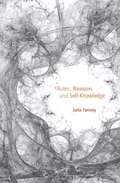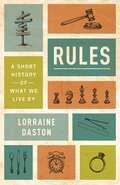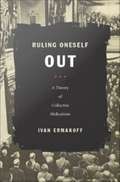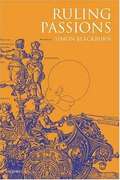- Table View
- List View
Rubber Boots Methods for the Anthropocene: Doing Fieldwork in Multispecies Worlds
by Nils Bubandt Astrid Oberborbeck Andersen Rachel CypherA methodological follow-up to Arts of Living on a Damaged Planet The environmental and climatic crises of our time are fundamentally multispecies crises. And the Anthropocene, a time of &“human-made&” disruptions on a planetary scale, is a disruption of the fabric of life as a whole. The contributors to Rubber Boots Methods for the Anthropocene argue that understanding the multispecies nature of these disruptions requires multispecies methods.Answering methodological challenges posed by the Anthropocene, Rubber Boots Methods for the Anthropocene retools the empirical study of the socioecological chaos of the contemporary moment across the arts, human science, and natural science. Based on critical landscape history, multispecies curiosity, and collaboration across disciplines and knowledge systems, the volume presents thirteen transdisciplinary accounts of practical methodological experimentation, highlighting diverse settings ranging from the High Arctic to the deserts of southern Africa and from the pampas of Argentina to the coral reefs of the Western Pacific, always insisting on the importance of firsthand, &“rubber boots&” immersion in the field.The methodological companion to Arts of Living on a Damaged Planet: Ghosts and Monsters of the Anthropocene (Minnesota, 2017), this collection puts forth empirical studies of the multispecies messiness of contemporary life that investigate some of the critical questions of our time.Contributors: Filippo Bertoni, Museum für Naturkunde, Berlin; Harshavardhan Bhat, U of Westminster; Nathalia Brichet, U of Copenhagen; Janne Flora, Aarhus U, Denmark; Natalie Forssman, U of British Columbia; Peter Funch, Aarhus U; Kirsten Hastrup, U of Copenhagen; Colin Hoag, Smith College; Joseph Klein, U of California, Santa Cruz; Andrew S. Mathews, U of California, Santa Cruz; Daniel Münster, U of Oslo; Ursula Münster, U of Oslo; Jon Rasmus Nyquist, U of Oslo; Katy Overstreet, U of Copenhagen; Pierre du Plessis, U of Oslo; Meredith Root-Bernstein; Heather Anne Swanson, Aarhus U; Anna Lowenhaupt Tsing, U of California,Santa Cruz; Stine Vestbo.
Rudolf Otto: An Introduction to His Philosophical Theology
by Philip C. AlmondAlmond places Otto's theory of religion within the context of his life (1869-1937), looking closely at the significant influences on Otto's thought, among them thinkers as different as Kant and the German Pietists. Elements of Otto's theories are shown to be closely related to the social and intellectual milieu of Germany both before and after World War I. Almond examines Otto's conception of the Holy, of rational and nonrational elements of religion, and compares his views with those of his contemporaries.Originally published 1984.A UNC Press Enduring Edition -- UNC Press Enduring Editions use the latest in digital technology to make available again books from our distinguished backlist that were previously out of print. These editions are published unaltered from the original, and are presented in affordable paperback formats, bringing readers both historical and cultural value.
Rudolph Ganz, Patriotism, and Standardization of The Star-Spangled Banner, 1907-1958
by Iain QuinnThis book examines the succession of events toward the potential standardization of the music for “The Star-Spangled Banner” from an initial letter to President Roosevelt in 1907 to the 1958 congressional hearings on the National Anthem, and the later work of the Swiss-Born American pianist, Rudolph Ganz. These events took place across five decades when a culture of public patriotism was especially pronounced for immigrant musicians. This book contextualizes the complementary experiences of a leading immigrant musician, Ganz, who successfully navigated the world of public patriotism while pursuing the realization of a standardized version. The materials are discussed through the lens of the performance practice. The legacy of standardization has not previously been examined. The response and actions of an immigrant, Ganz, in a culture of necessary patriotism for foreign-born artists shed important new light on this topic. It demonstrates the challenges, fears, and cultural expectations regarding the standardization of an important patriotic work.
Rugged Individualism: Dead or Alive?
by Gordon Lloyd David DavenportToday, American "rugged individualism" is in a fight for its life on two battlegrounds: in the policy realm and in the intellectual world of ideas that may lead to new policies. In this book, the authors look at the political context in which rugged individualism flourishes or declines and offer a balanced assessment of its future prospects. They outline its path from its founding—marked by the Declaration of Independence—to today, focusing on different periods in our history when rugged individualism was thriving or was under attack. The authors ultimately look with some optimism toward new frontiers of the twenty-first century that may nourish rugged individualism. They assert that we cannot tip the delicate balance between equality and liberty so heavily in favor of equality that there is no liberty left for individual Americans to enjoy. In considering reasons to be pessimistic as well as reasons to be optimistic about it, they also suggest where supporters of rugged individualism might focus greater encouragement and resources.
Ruggiero Boscovich’s Theory of Natural Philosophy: Points, Distances, Determinations (Science Networks. Historical Studies #60)
by Luca GuzzardiDrawing on published works, correspondence and manuscripts, this book offers the most comprehensive reconstruction of Boscovich’s theory within its historical context. It explains the genesis and theoretical as well as epistemological underpinnings in light of the Jesuit tradition to which Boscovich belonged, and contrasts his ideas with those of Newton, Leibniz, and their legacy. Finally, it debates crucial issues in early-modern physical science such as the concept of force, the particle-like structure of matter, the idea of material points and the notion of continuity, and shares novel insights on Boscovich’s alleged influence on later developments in physics. With its attempt to reduce all natural forces to one single law, Boscovich’s Theory of Natural Philosophy, published in 1758, left a lasting impression on scientists and philosophers of every age regarding the fundamental unity of physical phenomena. The theory argues that every pair of material points is subject to one mutual force — and always the same force — which is their propensity to be mutually attracted or repelled, depending on their distance from one another. Furthermore, the action of this unique force is visualized through a famous diagram that fascinated generations of scientists. But his understanding of key terms of the theory — such as the notion of force involved and the very idea of a material point — is only ostensibly similar to our current conceptual framework. Indeed, it needs to be clarified within the plurality of contexts in which it has emerged rather than being considered in view of later developments.The book is recommended for scholars and students interested in the ideas of the early modern period, especially historians and philosophers of science, mathematicians and physicists with an interest in the history of the discipline, and experts on Jesuit science and philosophy.
Ruhi Book 1: Reflections On The Life Of The Spirit
by Ruhi InstituteThe new edition of Ruhi Book 1, Reflections on the Life of the Spirit. This course is designed to develop one's ability to read and understand the Baha'i writings, to learn to apply those writings to one's life and community and to engage in various paths of service. The main themes covered include: Understanding the Bahá'í writings, prayer, and life after death.
Rule Breaking and Political Imagination
by Kenneth A. Shepsle“Imagination may be thought of as a ‘work-around.’ It is a resourceful tactic to ‘undo’ a rule by creating a path around it without necessarily defying it. . . . Transgression, on the other hand, is rule breaking. There is no pretense of reinterpretation; it is defiance pure and simple. Whether imagination or disobedience is the source, constraints need not constrain, ties need not bind.” So writes Kenneth A. Shepsle in his introduction to Rule Breaking and Political Imagination. Institutions are thought to channel the choices of individual actors. But what about when they do not? Throughout history, leaders and politicians have used imagination and transgression to break with constraints upon their agency. Shepsle ranges from ancient Rome to the United States Senate, and from Lyndon B. Johnson to the British House of Commons. He also explores rule breaking in less formal contexts, such as vigilantism in the Old West and the CIA’s actions in the wake of 9/11. Entertaining and thought-provoking, Rule Breaking and Political Imagination will prompt a reassessment of the nature of institutions and remind us of the critical role of political mavericks.
Rule by Multiple Majorities: A New Theory of Popular Control (Political Economy of Institutions and Decisions)
by Sean InghamWhat does it mean to say that citizens have control over their leaders? In a democracy, citizens should have some control over how they are governed. If they do not participate directly in making policy, they ought to maintain control over the public officials who design policy on their behalf. Rule by Multiple Majorities develops a novel theory of popular control: an account of what it is, why democracy's promise of popular control is compatible with what we know about actual democracies, and why it matters. While social choice theory suggests there is no such thing as a 'popular will' in societies with at least minimal diversity of opinion, Ingham argues that multiple, overlapping majorities can nonetheless have control, at the same time. After resolving this conceptual puzzle, the author explains why popular control is a realistic and compelling ideal for democracies, notwithstanding voters' low levels of information and other shortcomings.
Rule-following and Meaning
by Alexander Miller Crispin WrightThe rule-following debate, in its concern with the metaphysics and epistemology of linguistic meaning and mental content, goes to the heart of the most fundamental questions of contemporary philosophy of mind and language. This volume gathers together the most important contributions to the topic, including papers by Simon Blackburn, Paul Boghossian, Graeme Forbes, Warren Goldfarb, Paul Horwich, John McDowell, Colin McGinn, Ruth Millikan, Philip Pettit, George Wilson, Crispin Wright, and Jose Zalabardo. The debate has centred on Saul Kripke's reading of the rule-following sections in Wittgenstein and his consequent posing of a sceptical paradox that threatens our everyday notions of linguistic meaning and mental content. These essays are attempts to respond to this challenge and represent some of the most important work in contemporary theory of meaning. With an introductory essay and a comprehensive guide to further reading this book is an excellent resource for courses in philosophy of mind, philosophy of language, Wittgenstein, and metaphysics, as well as for all philosophers, linguists, and cognitive scientists with interests in these areas.
Rulebook for Arguments (Fourth Edition)
by Anthony WestonThis book is a brief introduction to the art of making arguments. It further discusses fairly simple arguments and moves to extended arguments and their use in essays and oral presentations at the end.
Rulers and Ruled
by Irving M. ZeitlinThis book illuminates several timeless principles of political philosophy that have come down to us through the ages in the writings of Plato, Aristotle, Machiavelli, Hobbes, Locke, Montesquieu, Rousseau, and the authors of the Federalist Papers, Madison, Hamilton, and Jay. Among these principles are the following: that a good society is based on law; that a good constitution balances social classes against each other; that a mixed constitution is best for this purpose; that popular sovereignty is the best foundation for a just and stable constitution; and that representative government is best for a large, complex society.In this valuable and accessibly written guide to the fundamentals of political thought, Irving Zeitlin shows that certain thinkers have given us insights that rise above historical context - 'trans-historical principles' that can provide the political scientist with an element of foresight, an ability not to predict events but to anticipate a certain range of possibilities. While the historian studies unique and unrepeatable circumstances such as those, for example, that gave rise to Julius Caesar, the political theorist, using these trans-historical principles, recognizes the conditions that can lead to Caesarism.Zeitlin draws on an unusual depth of knowledge, offering a lucid, interesting, and memorable summation of his chosen classic texts, in a work that will appeal strongly to his intended audience at the undergraduate level.
Rules and Dispositions in Language Use
by Florian Demont-BiaggiRules and Dispositions in Language Use explains how correct language use is governed by both rules and general human dispositions. It does so by bringing together themes from Ludwig Wittgenstein and Noam Chomsky, which for many years have been thought to be incompatible.
Rules and Exceptions in Biology: from Fundamental Concepts to Applications
by Alfredo V. Peretti Lucía S. Calbacho-Rosa Paola A. Olivero Mariela A. Oviedo-Diego David E. VrechThis is the first book to cover and explore the rules and exceptions in biology. It presents past and current perspectives on the subject and discusses the various situations of transition from rule to exception and vice versa. In doing so, the book fills a gap in the scientific literature and stimulates useful and valuable discussions among researchers working in biology worldwide. The chapters begin with a theoretical framework, followed by the main topic(s) or question(s), and a summary of previous work on the topic. Examples are discussed, with concluding remarks and suggestions for future research. A section with key concepts is included at the end of each chapter, allowing the reader to jump directly to the most important findings or observations. Each chapter is written to be used as a reference by graduate students and professionals from a variety of scientific disciplines (e.g. behavior, ecology, evolution, and systematics).
Rules and Meaning in Quantum Mechanics (European Studies in Philosophy of Science #13)
by Iulian D. ToaderThis book pursues an investigation at the intersection of philosophy of physics and philosophy of language, and offers a critical analysis of rival explanations of the semantic facts of quantum mechanics. The author presents new insights, including a reworking of Einstein's incompleteness argument, a fresh take on Bohr's correspondence principle, and several critiques of recent views in the philosophy of quantum logic. The book will be of interest to scholars and students whose philosophical work concerns language, logic, or physics.
Rules and Reasoning: Second International Joint Conference, RuleML+RR 2018, Luxembourg, Luxembourg, September 18–21, 2018, Proceedings (Lecture Notes in Computer Science #11092)
by Dumitru Roman Christoph Benzmüller Francesco Ricca Xavier ParentThis book constitutes the proceedings of the International Joint Conference on Rules and Reasoning, RuleML+RR 2018, held in Luxembourg during September 2018. This is the second conference of a new series, joining the efforts of two existing conference series, namely “RuleML” (International Web Rule Symposium) and “RR” (Web Reasoning and Rule Systems).The 10 full research papers presented together with 5 long technical communications and 7 short papers were carefully reviewed and selected from 33 submissions.
Rules and Reasoning: Third International Joint Conference, RuleML+RR 2019, Bolzano, Italy, September 16–19, 2019, Proceedings (Lecture Notes in Computer Science #11784)
by Diego Calvanese Paul Fodor Dumitru Roman Marco MontaliThis book constitutes the proceedings of the International Joint Conference on Rules and Reasoning, RuleML+RR 2019, held in Bolzano, Italy, during September 2019. This is the third conference of a new series, joining the efforts of two existing conference series, namely “RuleML” (International Web Rule Symposium) and “RR” (Web Reasoning and Rule Systems). The 10 full research papers presented together with 5 short technical communications papers were carefully reviewed and selected from 26 submissions.
Rules for the Inquiring Mind: A Unified Framework of Norms of Inquiry
by Luis RosaThis book concerns the nature and the norms of inquiry. It tackles not only philosophical issues regarding what inquiry is, but also issues regarding how it should and should not be executed. Roughly put, inquiry is the activity of searching for the true answers to questions of our interest. But what is the difference between empirical and armchair inquiry? And what are the right and the wrong ways to inquire? Under what conditions should one start inquiring? Which questions are such that one should not inquire into them? The book offers answers to these questions. It argues that competent armchair inquiry only makes explicit what was already implicit—the inquirer already had the answer to her question before inquiring into it, though this was not explicit to her. It also argues that we should avoid inquiring into questions whose answers are unknowable to us, in the instrumental sense of 'should', and that different modes of inquiry are called for, depending on which type of information is available to the subject. These answers are rigorously argued for, and they stem from a unified framework for modeling the activity of inquiry.
Rules in the Making: A Statistical Analysis of Regulatory Agency Behavior (RFF Policy and Governance Set)
by Winston Harrington Alan J. Krupnick Wesley MagatRules in the Making represents an attempt to revolutionize ways of thinking about regulatory decision-making. The book tries to show that statistical methodologies can be used to determine what factors are important in the establishment of government regulation by developing a mathematical model of the regulatory process and agency behavior. The model is then tested using a case study of the Environmental Protection Agency's setting of effluent discharge standards under the Clean Water Act. Originally published in 1986
Rules, Magic and Instrumental Reason: A Critical Interpretation of Peter Winch's Philosophy of the Social Sciences (Routledge Studies in Twentieth-Century Philosophy #8)
by Berel Dov LernerThis book offers a systematic and critical discussion of Peter Winch's writings on the philosophy of the social sciences. The author points to Winch's tendency to over-emphasize the importance of language and communication, and his insufficient attention to the role of practical, technological activites in human life and society.It also offers an appendix devoted to the controversy between the anthropologists Marshall Sahlins and Gananath Obeyesekere regarding Captain James Cook's Hawaiian adventures.Essential reading for those studying the development of philosophy in the twentieth century, this book will also be of great interest to anthropologists, sociologists, scholars of religion, and all those with an interest in the relationship between philosophy and the social sciences.
Rules, Politics, and the International Criminal Court: Committing to the Court (Global Institutions)
by Yvonne DuttonIn this new work, Dutton examines the ICC and whether and how its enforcement mechanism influences state membership and the court’s ability to realize treaty goals, examining questions such as: Why did states decide to create the ICC and design the institution with this uniquely strong enforcement mechanism? Will the ICC’s enforcement mechanism be sufficient to hold states accountable to their commitment so that the ICC can realize its goal of ending impunity for genocide, crimes against humanity, and war crimes? Will states view the ICC’s enforcement mechanism as a credible threat and refuse to join unless they already have good domestic human rights practices and institutions that are independent and capable of prosecuting human rights abuses? If states that most need to improve their domestic legal practices as relates to protecting against human rights abuses do not join the court, is there any hope that the threat of punishment by the ICC can play a role in bettering state’s human rights practices and deterring individuals from committing mass atrocities? This work provides a significant contribution to the field, and will be of great interest to students and scholars of international law, international relations, international organizations and human rights.
Rules, Reason, and Self-Knowledge
by Julia TanneyTanney challenges not only the cognitivist approach that has dominated philosophy and the special sciences for fifty years, but metaphysical-empirical approaches to the mind in general. Rules, Reason, and Self-Knowledge advocates a return to the world-involving, circumstance-dependent, normative practices where the rational mind has its home.
Rules: A Short History of What We Live By (The Lawrence Stone Lectures #23)
by Lorraine DastonA panoramic history of rules in the Western worldRules order almost every aspect of our lives. They set our work hours, dictate how we drive and set the table, tell us whether to offer an extended hand or cheek in greeting, and organize the rites of life, from birth through death. We may chafe under the rules we have, and yearn for ones we don’t, yet no culture could do without them. In Rules, historian Lorraine Daston traces their development in the Western tradition and shows how rules have evolved from ancient to modern times. Drawing on a rich trove of examples, including legal treatises, cookbooks, military manuals, traffic regulations, and game handbooks, Daston demonstrates that while the content of rules is dazzlingly diverse, the forms that they take are surprisingly few and long-lived.Daston uncovers three enduring kinds of rules: the algorithms that calculate and measure, the laws that govern, and the models that teach. She vividly illustrates how rules can change—how supple rules stiffen, or vice versa, and how once bothersome regulations become everyday norms. Rules have been devised for almost every imaginable activity and range from meticulous regulations to the laws of nature. Daston probes beneath this variety to investigate when rules work and when they don’t, and why some philosophical problems about rules are as ancient as philosophy itself while others are as modern as calculating machines.Rules offers a wide-angle view on the history of the constraints that guide us—whether we know it or not.
Ruling America: A History of Wealth and Power in a Democracy
by Gary GerstleRuling America offers a panoramic history of our country's ruling elites from the time of the American Revolution to the present. At its heart is the greatest of American paradoxes: How have tiny minorities of the rich and privileged consistently exercised so much power in a nation built on the notion of rule by the people? In a series of thought-provoking essays, leading scholars of American history examine every epoch in which ruling economic elites have shaped our national experience. They explore how elites came into existence, how they established their dominance over public affairs, and how their rule came to an end. The contributors analyze the elite coalition that led the Revolution and then examine the antebellum planters of the South and the merchant patricians of the North. Later chapters vividly portray the Gilded Age "robber barons," the great finance capitalists in the age of J. P. Morgan, and the foreign-policy "Establishment" of the post-World War II years. The book concludes with a dissection of the corporate-led counter-revolution against the New Deal characteristic of the Reagan and Bush era. Rarely in the last half-century has one book afforded such a comprehensive look at the ways elite wealth and power have influenced the American experiment with democracy. At a time when the distribution of wealth and power has never been more unequal, Ruling America is of urgent contemporary relevance.
Ruling Oneself Out: A Theory of Collective Abdications
by Ivan ErmakoffWhat induces groups to commit political suicide? This book explores the decisions to surrender power and to legitimate this surrender: collective abdications. Commonsensical explanations impute such actions to coercive pressures, actors' miscalculations, or their contamination by ideologies at odds with group interests. Ivan Ermakoff argues that these explanations are either incomplete or misleading. Focusing on two paradigmatic cases of voluntary and unconditional surrender of power--the passing of an enabling bill granting Hitler the right to amend the Weimar constitution without parliamentary supervision (March 1933), and the transfer of full executive, legislative, and constitutional powers to Marshal Ptain (Vichy, France, July 1940)--Ruling Oneself Out recasts abdication as the outcome of a process of collective alignment. Ermakoff distinguishes several mechanisms of alignment in troubled and uncertain times and assesses their significance through a fine-grained examination of actors' beliefs, shifts in perceptions, and subjective states. To this end, he draws on the analytical and methodological resources of perspectives that usually stand apart: primary historical research, formal decision theory, the phenomenology of group processes, quantitative analyses, and the hermeneutics of testimonies. In elaborating this dialogue across disciplinary boundaries, Ruling Oneself Out restores the complexity and indeterminate character of pivotal collective decisions and demonstrates that an in-depth historical exploration can lay bare processes of crucial importance for understanding the formation of political preferences, the paradox of self-deception, and the makeup of historical events as highly consequential.
Ruling Passions: A Theory of Practical Reasoning
by Simon BlackburnSimon Blackburn puts forward a compelling and original philosophy of human motivation and morality. Why do we behave as we do? Can we improve? Is our ethics at war with our passions, or is it an upshot of those passions? Blackburn seeks the answers to such questions in an exploration of the nature of moral emotions and the structures of human motivation. He develops a naturalistic ethics, which integrates our understanding of ethics with the rest of our understanding of the world we live in. His theory does not debunk the ethical by reducing it to the non-ethical, and it banishes the spectres of scepticism and relativism that have haunted recent moral philosophy. Ruling Passions reveals how ethics can maintain its authority even though it is rooted in the very emotions and motivations that it exists to control.

